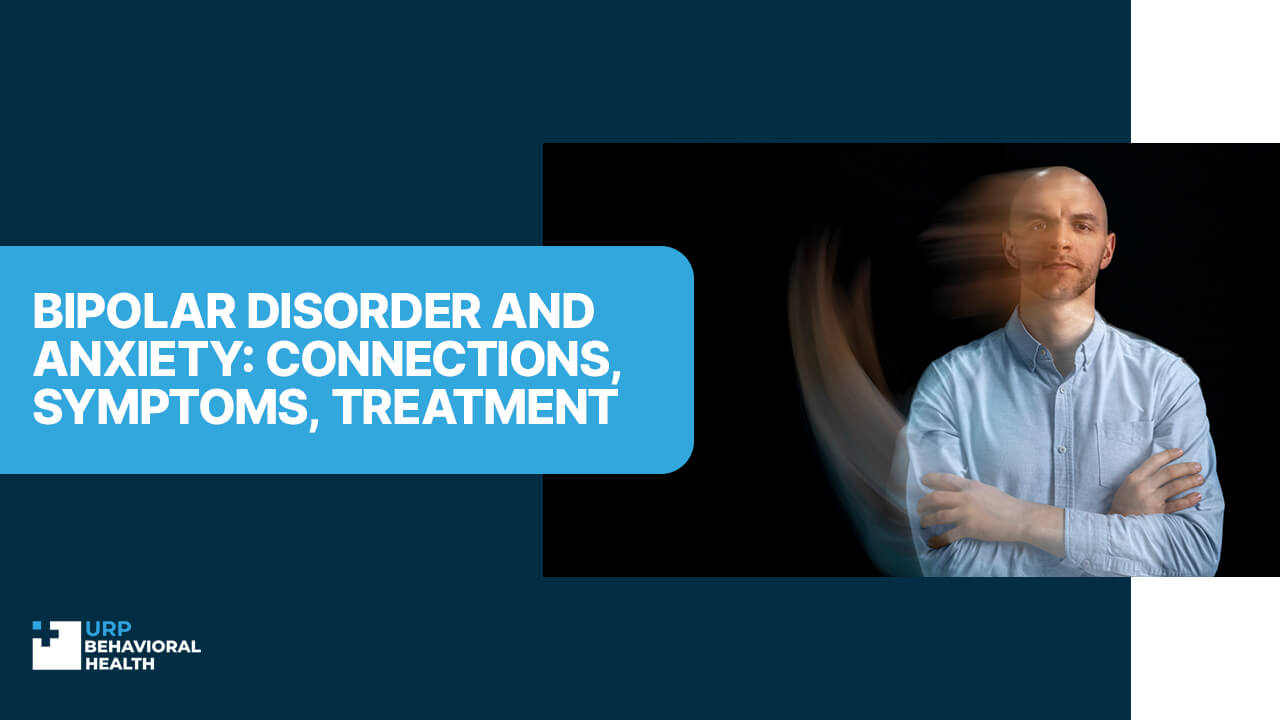
Bipolar Disorder and Anxiety: Connections, Symptoms, Treatment
The correlation between bipolar disorder and anxiety is well-understood for diagnosis and management. Both conditions have a considerable impact on a person’s life, resulting in complex and challenging symptoms that often cross over, ranging from severe to very challenging. Recognizing the interaction between these disorders can aid in utilizing better management methods and enhancing the quality of life for those affected.
The Connection Between Bipolar Disorder and Anxiety
Bipolar disorder patients often exhibit co-occurring anxiety disorders, including generalized anxiety disorder (GAD), panic disorder, and social anxiety disorder, alongside bipolar disorder. Research indicates that anxiety disorders are responsible for affecting almost half of individuals with bipolar disorder, underscoring the mutual overlapping impact of depression and anxiety disorders. Common underlying mechanisms or risk factors that play a role in both conditions are suggested by the significant overlap, leading to accepted and unaccountable factors. [1].
How Do Bipolar & Anxiety Affect Each Other?
The shared health issues of bipolar depression and anxiety can negatively impact the health of both individuals in a severe cycle, as their health issues can affect each other. Bipolar individuals may experience mood swings that are accompanied by anxiology, which can lead to the development of more severe manic or depressive episodes. In contradistinction, the abrupt occurrences of bipolar disorder, which can vary based on the person’s mood state, can cause greater anxiety and a more challenging struggle with the disorder, making the two conditions more difficult to handle despite being symptoms-wise. This bidirectional relationship demonstrates that integrated treatment methods that address both disorders simultaneously are significant. Anxiety may contribute to the development of schizophrenia in adults, while also increasing sleep disturbances that may be influenced by anxiety or bipolar disorder in individuals with the disorder.[2].
Can Anxiety Lead to Bipolar Disorder?
Anti-anxiety treatment is not a direct cause of bipolar disorder in adults, but it can be a significant stressor that triggers mood swings in predisposed individuals. Manic or depressive episodes may result from heightened stress levels and emotional stress caused by anxiety, which can be exacerbated by stress and anxiety. Diagnosis and treatment of bipolar disorder is sometimes more complicated due to persistent anxiety that obscures the clinical picture. Therefore, it is crucial to manage anxiety effectively to prevent exacerbation of bipolar symptoms [3].
Don’t wait - confidential help is available right now for you or your loved one.

Does Bipolar Cause Anxiety?
Precariously developed mood swings can lead to anxiety symptoms and vice versa; when bipolar disorder causes mood swings, anxiety symptoms often accompany Bipolar disorder. Manic episodes, which often last longer than a typical rest of the week, may lead to increased anxiety and agitation. Depression is sometimes accompanied by anxiety during a depressive episode, and intense worry, fear, and panic attacks can also cause anxiety. Anxiety can both increase the risk of bipolar disorder and challenge the management of its effects over an extended period. [4].
Symptoms of Bipolar Anxiety
Symptoms of bipolar anxiety can vary widely but often include:
- Persistent worry or fear
- Restlessness or feeling on edge
- Difficulty concentrating
- Irritability
- Muscle tension
- Sleep disturbances
- Panic attacks
- Avoidance of situations that may trigger anxiety
Symptoms of anxiety can intersect with both manic and depressive episodes, making the diagnosis and management of bipolar disorder more complex. Comprehensive assessments by healthcare providers are crucial to distinguish between these symptoms and create effective, individualized treatment plans.[5].
Treating Bipolar Disorder & Anxiety
Looking at bipolar disorder and anxiety as a dual diagnosis requires a comprehensive and integrated approach to treating both conditions. Despite the prevalent role of medications, this discussion highlights non-pharmacological strategies and emphasizes the importance of using strategies without medications. For individual treatment needs, it is important to consult a health care professional to ensure that the appropriate planning is done.
- Psychotherapy. CBT can effectively help manage both bipolar disorder and anxiety by addressing harmful thought patterns and behaviors. By targeting and changing negative thought patterns and behaviors, it operates to decrease the symptoms that indicate an underlying problem. Through psychological interventions, CBT also addresses and challenges harmful thought patterns, promoting healthier thinking and coping strategies. Another popular treatment option is Interpersonal and Social Rhodostimtim Treatment (IPSRT), which aids in developing daily habits and improving interpersonal relationships, and can reduce the effects of mood swings and anxiety in individuals. [6].
- Lifestyle Modifications. Lifestyle alteration can have a significant impact on the treatment of bipolar disorder and anxiety when combined with the management of symptoms. Stabilizing mood and reducing anxiety levels can be achieved through consistent physical activity, a healthy diet, and adequate sleep, as well as through dietary habits. Mindfulness, meditation, and relaxation exercises are powerful stress management techniques that can help manage stress and pain. Individuals with bipolar disorder often experience anxiety due to unpredictability, which can be exacerbated by the unpredictability caused by unpredictability, but implementing a daily routine can significantly reduce this unpredictability.[7].
- Support Systems. For those dealing with bipolar disorder and anxiety, it is important to build a strong support system and prioritize forming a support system. Supportive emotional support, practical assistance, and encouragement can be received through family, friends, support groups, and mental health professionals, among others. People with comorbid conditions can rely on support systems to adhere to treatment plans, identify early symptoms of mood episodes, and thrive despite challenges and other barriers. [8].
Reach out today and let us create a treatment plan designed around your needs.

Conclusion
Identifying the interrelation between bipolar disorder and anxiety is critical for understanding the need to develop treatment plans. Both co-existing and contributing to each other’s symptoms are essential for both conditions to be coexisting and integrated treatment approaches. Seeking professional help is vital if you or a loved one is experiencing bipolar disorder with anxiety. Both are conditions that can improve quality of life considerably. Individuals with both conditions can receive rapid diagnosis and effective treatment, resulting in an overall quality of life.
Sources
- National Institute of Mental Health (NIMH). (2024). “Bipolar Disorder.” https://www.nimh.nih.gov/health/topics/bipolar-disorder
- American Psychiatric Association. (2024). “What Is Bipolar Disorder?” https://www.psychiatry.org/patients-families/bipolar-disorders/what-are-bipolar-disorders
- National Alliance on Mental Illness (NAMI). (2017). “Bipolar Disorder.” https://www.nami.org/About-Mental-Illness/Mental-Health-Conditions/Bipolar-Disorder
- Cerullo, M. A., & Strakowski, S. M. (2007). “The prevalence and significance of substance use disorders in bipolar type I and II disorder.” https://pubmed.ncbi.nlm.nih.gov/17908301/
- Bauer, M., & Whybrow, P. C. (2001). “Thyroid hormone, neural tissue, and mood modulation.” https://pubmed.ncbi.nlm.nih.gov/12587187/
- American Psychiatric Association. (2013). “Diagnostic and Statistical Manual of Mental Disorders (DSM-5).”
- Miklowitz, D. J. (2002). “The Bipolar Disorder Survival Guide: What You and Your Family Need to Know.”
- Colom, F., & Vieta, E. (2006). “Psychoeducation Manual for Bipolar Disorder.”
















